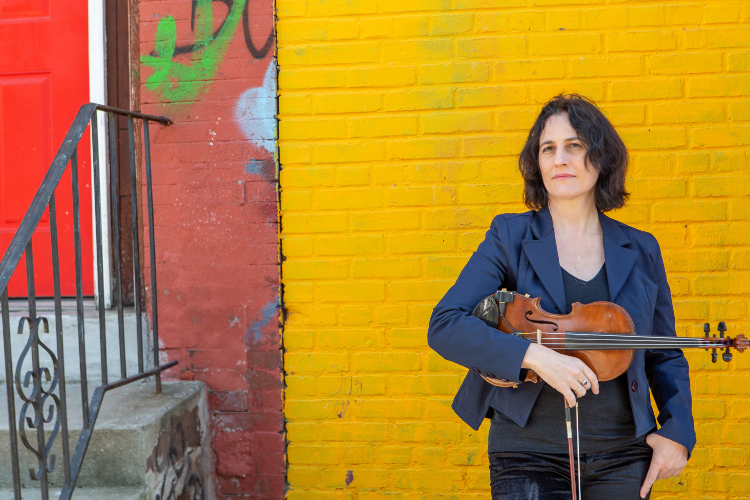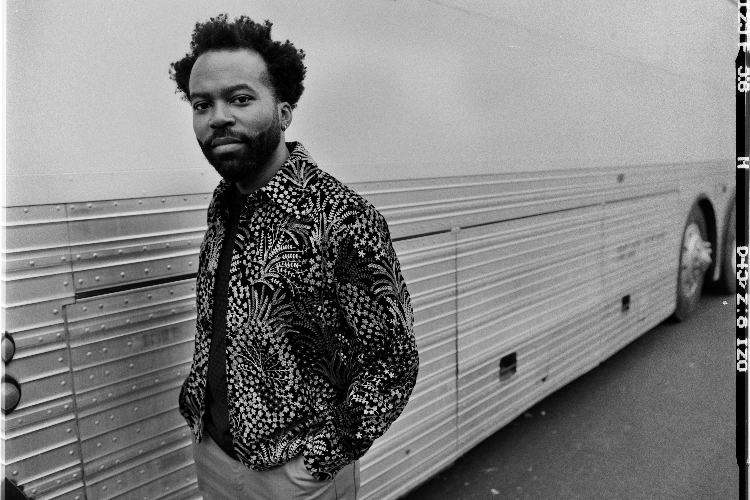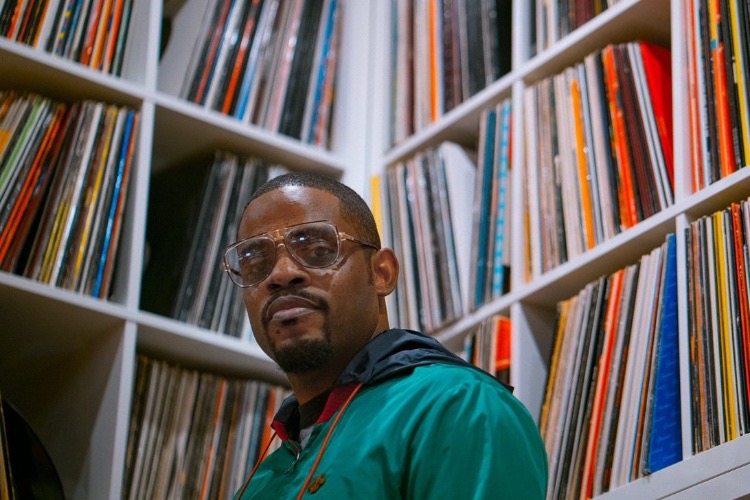Veer: A Conversation with Sarah Bernstein
|
Getting your Trinity Audio player ready...
|
If you want to make a career in contemporary creative music, you could do worse than use the Projects page on Sarah Bernstein’s website as your guide. You’ll find entries for solo processed violin and voice; noise drums, violin, and vocals; minimalist experimental poetry performance; experimental synth-pop; a string quartet; and even a catalogue raisonné of compositions and film scores. And those are just the violinist’s own projects. Bernstein has been an essential contributor to chamber ensembles, orchestras, improvising groups, and unclassifiable formations since she arrived in New York in 1996. A career as varied as Bernstein’s resists easy summary, but VEER Quartet (New Focus, 2022) is a congenial and instructive point of departure. An improvising quartet that brings jazz freedom to the venerable chamber-music formation, VEER’s music overflows with sonic and structural invention while being highly readable, even for those listeners with a fear of new music. How Bernstein arrived at this music and her quintessentially post-genre music career is the subject of the interview conducted by phone in August 2022.
PostGenre: Tell us a bit about your early life, the music that you heard, and how you came to the violin.
Sarah Bernstein: In the house, Bach was very present. So were blues recordings. And, from my own radio, listening, to all types of rock and pop from all eras. rowing up in San Francisco in the 80s, the ‘70s loomed large, everything from rock and soul and funk. Even salsa recordings and this kind of stuff were in the mix in my neighborhood.
My picking up the violin was public school-driven. I was five, I think, when I had a few years of piano lessons. At about seven or eight, I had the opportunity to play in school. We actually had good music programs at that time. By middle school, I began learning music theory and chamber music. We had summer programs as well, and I pretty much just played music all the time, not thinking about whether I was serious about it or not. I think it surprised some people when I later decided to pursue it as my major in college. And that’s really when I started practicing.
PG: You went to CalArts, which must have been a very different kind of conservatory experience than you would have at, say, Juilliard or The Curtis Institute.
SB: My major was violin performance, but I took classes in composition and all kinds of subjects. I was already very involved in multimedia things even before that, so I thought I would go in and do some singing/poetry/violin composition-type thing. And [CalArts] was like, Oh, no, no, no! We have this nice scholarship for you to do a performance major. And so I focused on performance. I ended up playing a lot of what came to be called new music and living composers’ music. There was also a great jazz program going on at the same time; Charlie Haden and Roscoe Mitchell were there. I did do a little bit with them, but I was extremely busy with the performance major and some of my other pursuits there, which were North Indian classical music and African drumming.
PG: Growing up in San Francisco and going to school at CalArts, were artists like the Kronos Quartet and Laurie Anderson pretty important in your development?
SB: Definitely. Not in terms of imitation, but more in terms of the possibilities of music. I really love everything [Laurie] does. I never had the urge to do anything quite like it, but I used some of the same elements: combining texts and violin. I have a band right now called Day So Far. I sing and play violin and also keyboard. It’s a synth-pop band with my husband, Stuart Popejoy. As for Kronos, I have heard them many times, and it’s a similar thing in the sense that they showed me what’s possible.
PG: Given the breadth of your musical interests and the kinds of musical experiences that you have to draw on, what did you have in mind when you set out to do this VEER Quartet recording?
SB: I consider this album a jazz album. People think I’m a jazz artist, and that’s okay. That’s great. And I’m honored by that classification. Jazz is also my background, and speaking compositionally, it’s how I write. I’m not saying I write in a traditional jazz way. I don’t. But I do write in a way that jazz musicians today understand perfectly. I write charts. I write chord progressions. I write where to solo. Occasionally, I’ll do something else that is more in a framework of new music or contemporary classical or whatever, but very rarely. I write a few things that are through-composed that anyone could play, but mostly I write for musicians that are improvisers and who have a jazz background. Everyone in my VEER Quartet has a strong jazz background. They’re actually more rooted in jazz than anything else. But, by jazz, I mean avant-garde jazz, experimental jazz, creative, New Jazz, not something else.
PG: On VEER Quartet, your writing is very readable. It’s not pastiche or stuck in any idiom, but still very understandable to those who might listen to the Shostakovich quartets, 1980s Kronos stuff, or John Zorn. It makes perfect sense, and it’s extremely accessible. Did you intend it to be that way when you set out to write this material?
SB: I think that’s just how I write. I think it goes back to the fact that I’m melodic. For some people, that’s a problem. That’s not what they want to hear. I think it is accessible, and I think maybe that’s the pop/rock side of, what I have to offer. What I think about my own music is going to be different than what somebody else hears. But I think my noise music is very accessible. Exolinger (577 Records, 2020), a solo album I put out last year, has some pretty strong noise elements and most of the stuff I do with John Colpitts gets to this kind of noisy electronic place, I guess, but I still hear the melody. When it comes to strings, some people actually prefer things that are not accessible. So they might struggle with it in the opposite direction, but I’m okay with it. I embrace that it’s accessible.
PG: To somebody whose main point of reference is jazz, the VEER Quartet is a kind of all-star group. How did you put this quartet together?
SB: I know [violinist] Sana [Nagano] from the Go Organic orchestra, Adam Rudolph’s ensemble that we both play in. I know Leonor [Falcón, the violist] from the music scene around New York, and Nick [Jozwiak] I had heard play a few times before. We’re all here in New York and Brooklyn, and doing our thing, and we do cross paths. So I got to see who might be the right fit for this group. It wasn’t my first try. I started working on most of the music on the album some years before and had been playing string quartet concerts with different musicians trying to find the right combination. It had gotten frustrating, to be honest, and I let it go for a second. Then somebody hired me to put together a string quartet for another project, and I thought about it again. Sana, Leo, and Nick played that gig and we had a great rapport right away. So, it’s a little bit of a magic thing, as all bands are. But I feel that, with a string quartet, you rely on magic more so than with some other ensembles. They all have great freedom in their playing, while also being really detail-oriented, really being happy to dig into parts, challenging parts, and also keeping really open-minded about expressing themselves in my group, even if it’s slightly different from what they normally do every day. It takes a little bit of open-mindedness to dig into somebody else’s concept.
PG: It’s kind of amazing that before Kronos, the prevailing image of a string quartet was a bunch of baggy Eastern European guys playing stuffy, boring, old music. Now quartets are making some of the coolest music out there. As a string player yourself, you must look at that phenomenon with some amusement.
SB: Actually, there have always been interesting string quartets. Sometimes we forget about them. I don’t have the whole history in my head, but you’ll see them on all these jazz albums from the ‘70s and ‘80s, and it’s like, “Who are those string players? Oh, that’s so-and-so!” I heard one recently: The Black Swan Quartet. It’s a beautiful album with writing by Akbar Ali. I was blown away by it, a really nice sound. I think where string quartets have come into their own is that where once they would be accompanying someone, maybe alongside a jazz ensemble, now they’re at the center.
PG: This may be a boring question, but a rich one nonetheless: How did you get through the pandemic?
SB: I basically stayed home and worked on things that I could do on my own. Normally I would do a lot more things in town. Instead, I pretty much limited it to just the things that I felt I needed to do and focused on getting this album out.
PG: Some musicians have said that the pandemic allowed them to practice every day or write tons of new compositions.
SB: I’m not gonna say that. It was different for me. The pandemic gave me a chance to do things a little differently. I enjoy doing things a little differently, but it’s stressful, too. Now I’m about to go on tour in Europe. I had many things canceled, and some of them we got rescheduled until, basically, now. I have a trio that’s based in Switzerland. for which I booked some things and we’re going to record in September. I also scheduled a solo show and I’m going to play with Tomeka Reid in Moers, where she’s the artist in residence.
PG: Is this your first time out of the country since 2020 and, if so, are you apprehensive, looking forward to it, or a little of both?
SB: Oh yeah. I’m definitely apprehensive, but . . . onward.
PG: To conclude, here’s a very rich question with which broadcaster Josh Jackson ended his interviews: What is it like to live with music?
SB: I guess I would say it’s a lot of things and it has changed a lot over the years. There’s having your instrument that’s part of your life. It’s almost another arm, your voice. It’s an externalization of your internal self, and that’s really helpful and wonderful. Then there’s the other part of music which is all of the details of being self-employed. The instrument kind of brings me back to myself and takes me away from that other part. But, to me, they’re both parts of music now; the part that is grounding and the part that’s the opposite, almost like a scattering feeling. Sometimes there’s a lot of chaos surrounding having music in your life.
PG: How do you get to the grounding part? Do you have a particular method, spiritual practice, or disciplinary practice that helps you do it? You have been doing this for a long time and must have something–call it a coping mechanism if you like.
SB: The music itself gives me what I need. I don’t have other meditation practices, per se. Music grounds me by practicing, which is very, very meditative. And I also like composing. It’s sometimes intense, but also really fulfilling. I go to the music for the music.
VEER Quartet will be available on New Focus Recordings on September 2, 2022. It can be purchased on Bandcamp.
More information on Bernstein is available on her website.
Photo credit: Gretchen Robinette



